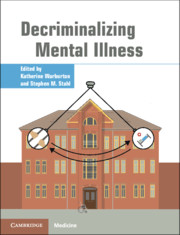Book contents
- Decriminalizing Mental Illness
- Decriminalizing Mental Illness
- Copyright page
- Contents
- Contributors
- Part I Introduction/Description of the Problem
- Part II Solutions
- Chapter 10 Jail Diversion: The Miami Model
- Chapter 11 Jail Diversion: A Practical Primer
- Chapter 12 Principles and Practices of Risk Assessment in Mental Health Jail Diversion Programs
- Chapter 13 Decriminalization in Action: Lessons from the Los Angeles Model
- Chapter 14 Economics of Decriminalizing Mental Illness: When Doing the Right Thing Costs Less
- Chapter 15 Decriminalizing Severe Mental Illness by Reducing Risk of Contact with the Criminal Justice System, Including for Forensic Patients
- Chapter 16 The Cal-DSH Diversion Guidelines
- Chapter 17 Decriminalizing Mental Illness: Specialized Policing Responses
- Part III Psychopharmacological Treatment Considerations
- Part IV Nonpsychopharmacological Treatment Considerations
- Part V Criminal Justice and Social Considerations
- Index
- References
Chapter 13 - Decriminalization in Action: Lessons from the Los Angeles Model
from Part II - Solutions
Published online by Cambridge University Press: 19 October 2021
- Decriminalizing Mental Illness
- Decriminalizing Mental Illness
- Copyright page
- Contents
- Contributors
- Part I Introduction/Description of the Problem
- Part II Solutions
- Chapter 10 Jail Diversion: The Miami Model
- Chapter 11 Jail Diversion: A Practical Primer
- Chapter 12 Principles and Practices of Risk Assessment in Mental Health Jail Diversion Programs
- Chapter 13 Decriminalization in Action: Lessons from the Los Angeles Model
- Chapter 14 Economics of Decriminalizing Mental Illness: When Doing the Right Thing Costs Less
- Chapter 15 Decriminalizing Severe Mental Illness by Reducing Risk of Contact with the Criminal Justice System, Including for Forensic Patients
- Chapter 16 The Cal-DSH Diversion Guidelines
- Chapter 17 Decriminalizing Mental Illness: Specialized Policing Responses
- Part III Psychopharmacological Treatment Considerations
- Part IV Nonpsychopharmacological Treatment Considerations
- Part V Criminal Justice and Social Considerations
- Index
- References
Summary
The insane criminal has nowhere any home: no age or nation has provided a place for him. He is everywhere unwelcome and objectionable. The prisons thrust him out; the hospitals are unwilling to receive him. And yet humanity and justice, the sense of common danger, and a tender regard for a deeply degraded brother-man, all agree that something should be done for him—that some plan must be devised different from, and better than any that has yet been tried, by which he may be properly cared for, by which his malady may be healed, and his criminal propensity overcome.
- Type
- Chapter
- Information
- Decriminalizing Mental Illness , pp. 127 - 131Publisher: Cambridge University PressPrint publication year: 2021

